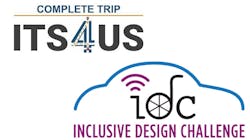USDOT awards $41 million to improve transportation design and access
The U.S. Department of Transportation (USDOT) has awarded a total of $41 million to 15 teams through two programs developed to improve transportation access to persons with disabilities and individuals with mobility challenges.
“These exciting projects support the development of new innovative, inclusive, and affordable transportation technologies that address mobility and access challenges,” said U.S. Secretary of Transportation Elaine L. Chao.
USDOT awarded more than $38 million to five awardees through its Complete Trip - ITS4US Deployment Program. The projects will enable communities to showcase innovative business partnerships, technologies and practices that promote independent mobility for all. The three-phased effort brings together public-sponsored and private-sponsored research. It also will create large-scale, replicable deployments that generate increased mobility options across multiple modes of transportation to address the challenges of planning and executing complete trips.
USDOT also awarded $3 million to 10 semifinalists through its Inclusive Design Challenge. The multi-stage competition seeks design solutions to make Autonomous Vehicles (AVs) more accessible to persons with disabilities through hardware or software solutions that enable independent use of AVs by persons with disabilities or mobility issues. The 10 projects, each receiving $300,000, will have 18 months to develop their proposed ideas into prototypes. USDOT will later select three final winners that will receive the remaining $2 million of the $5 million total prize in 2022.
The Complete Trip - ITS4US Deployment Program received 24 eligible proposals by organizations from 15 states. The winning teams and projects are:
California Association of Coordinated Transportation (CALACT)
Location: California, Oregon and Washington
Project: Plan, Book and Pay for Demand-responsive Transit Agencies
Award: $5,311,000
Atlanta Regional Commission (ARC)
Location: Gwinnet County, Georgia
Project: Safe Trips in Connected Transportation Network
Award: $9,388,404
Heart of Iowa Regional Transit Agency (HITRA)
Location: Dallas County, Iowa
Project: Health Connector for the Most Vulnerable: An Inclusive Mobility Experience from Beginning to End
Award: $3,956,806
University of Washington
Location: Baltimore, Maryland; Portland, Oregon; Bellevue, Washington
Project: Accessible Mapping Standards and Data Collaboration Drive Accessible Multimodal Active Transportation and Mobility
Award: $11,459,000
ICF International, Inc.
Location: Buffalo, New York
Project: Complete Trip Deployment in Buffalo
Award: $8,235,661
The Inclusive Design Challenge received 47 eligible applications from industry, academic institutions and individuals representing 21 states. The winning teams and projects (each recipients of $300,000) are:
Waymo
Location: Mountain View, California
Project: AV Wayfinding
AbleLink Smart Living Technologies
Location: Colorado Springs, Colorado
Project: WayFinder ADS
Foresight Augmented Reality LLC
Location: Atlanta, Georgia
Project: Accessibility for Sensory Disabilities and Aging Populations Traveling on Automated Vehicles
Purdue University
Location: West Lafayette, Indiana
Project: Efficient, Accessible and Safe Interaction in a Real Integrated Design Environment for Riders with disabilities (EASI RIDER)
University of Kansas
Location: Lawrence, Kansas
Project: Optimizing Highly Automated Driving Systems for People with Cognitive Disabilities
University of Maine
Location: Orono, Maine
Project: Autonomous Vehicle Assistant (Ava): Ride-hailing and localization for the future of accessible mobility
Boston University
Location: Boston, Massachusetts
Project: OpenGuide: A Scalable Human-Like Guidance System for Visually Impaired Travelers
May Mobility
Location: Ann Arbor, Michigan
Project: Independent Safety for Wheelchair Users in AVs
Carnegie Mellon University - Human-Computer Interaction Institute
Location: Pittsburgh, Pennsylvania
Project: Promoting personal control of AVs through inclusive smartphone communication interfaces
Clemson University
Location: Clemson, South Carolina
Project: Accessible Technology Leverage for Autonomous vehicles System: ATLAS II
